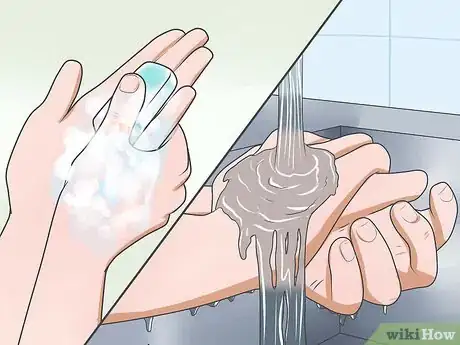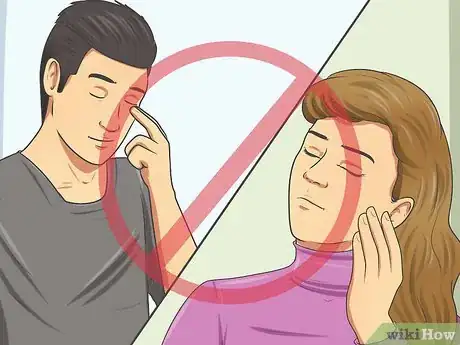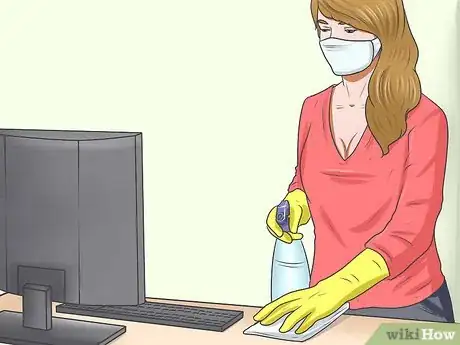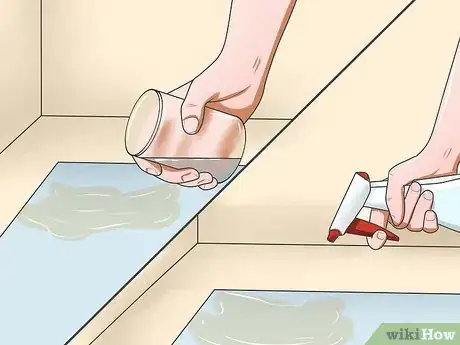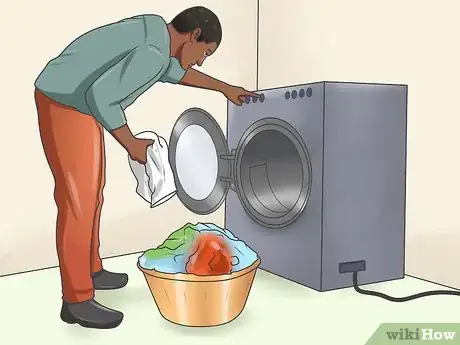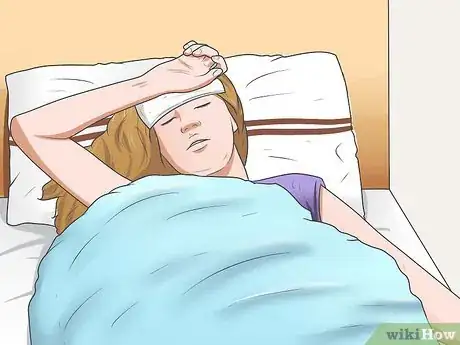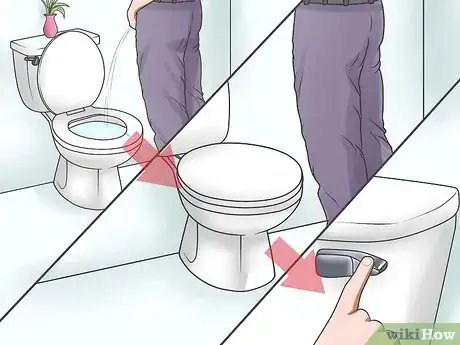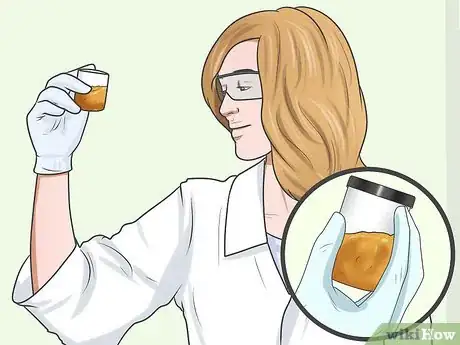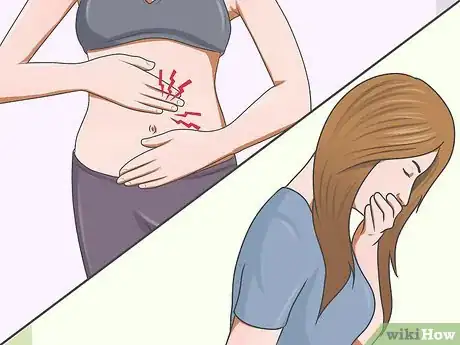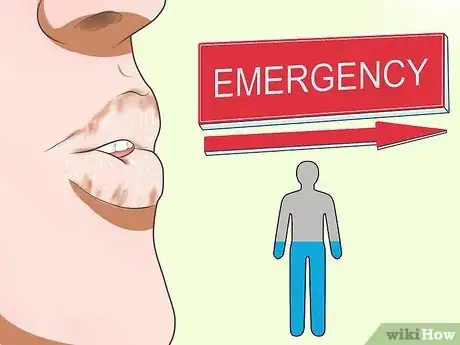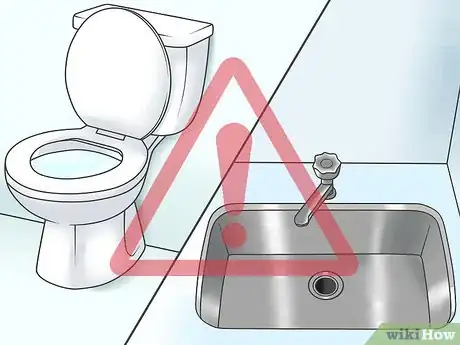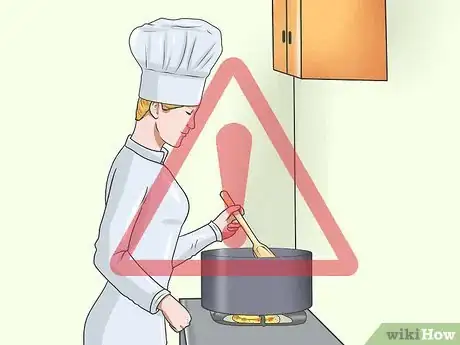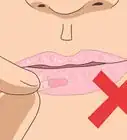This article was medically reviewed by Luba Lee, FNP-BC, MS. Luba Lee, FNP-BC is a Board-Certified Family Nurse Practitioner (FNP) and educator in Tennessee with over a decade of clinical experience. Luba has certifications in Pediatric Advanced Life Support (PALS), Emergency Medicine, Advanced Cardiac Life Support (ACLS), Team Building, and Critical Care Nursing. She received her Master of Science in Nursing (MSN) from the University of Tennessee in 2006.
There are 19 references cited in this article, which can be found at the bottom of the page.
This article has been viewed 17,126 times.
There are about 19-21 million cases of norovirus annually in the U.S. alone.[1] This very contagious virus, which causes symptoms like diarrhea and vomiting, can quickly spread between people or through contaminated food and water.[2] While the symptoms usually last about 1 to 3 days, an infected person may stay contagious for weeks or even months.[3] If you are concerned about getting norovirus or spreading it to others, there are ways that you can decrease your risk.
Steps
Prevention
-
1Practice proper hand hygiene. Hand hygiene is the cornerstone of prevention against the transmission of the norovirus. Norovirus is transmitted via fecal-oral transmission, so washing your hands after using the restroom or changing a diaper is one of the best ways to prevent the disease. You should also wash your hands before preparing or touching food.[4]
- To practice proper hand washing, put soap on your hands and rub the soap in. Rinse off the soap with warm or comfortably hot water for 20 seconds or more.
- Make sure to wash between your fingers, on the backs of your hands, and under your nails.
- If you don’t have access to running water and soap, you can use an alcohol-based hand sanitizer or prepackaged alcohol pads. However, keep in mind that hand sanitizers aren’t as effective as soap and water.
-
2Keep your hands away from your face. The most common way to contract norovirus is to ingest it. If you avoid touching your face or putting your hands near your mouth, you will be less likely to get the virus. You can also get the virus by touching your nose and eyes, so keep your hands away from these areas as well.[5]
- It can be hard to keep your hands off your face. If you feel the urge to scratch an itch on your nose or move some stray hair out of your eyes, try using the back of your hand or covering your fingers with a tissue.[6]
-
3Handle and cook food properly. When you are preparing food, wash all fruits and vegetables thoroughly with clean, running water. Keep all your cooking surfaces and utensils clean between uses. Since the virus can be transmitted via contaminated water, cook oysters and other shellfish well before you eat them. They should be cooked at temperatures higher than 145 °F (63 °C).[7]
- Don’t prepare food while you are suffering from the norovirus, or for at least 2 days after your symptoms have subsided.
- Do not change a baby’s diapers near the same area where food is prepared, such as in the kitchen. Take the baby to a separate room and wash your hands well before returning to the kitchen.
- Always wash your hands with soap and water before preparing, serving, or eating food.[8]
-
4Clean commonly used surfaces often. There are many places in your home that are touched by every member of your family. Doorknobs, countertops, computer keyboards, handheld electronic devices, and any surface in the bathroom and kitchen are common places where norovirus might live. Clean these areas with household cleaners that contain bleach.[9]
- You can keep bleach wipes handy to wipe down these surfaces every day. This will help you cut down on any transmission from your family members or guests to your home.
- Use 5–25 tablespoons (74–370 mL) of household bleach per 1 gallon (3.8 L) of water to make your own norovirus-fighting bleach solution.[10]
- Bleach is the most effective household disinfectant against norovirus. However, if you’re cleaning a surface that could be damaged by bleach, you can use concentrated Lysol or Pinesol instead. You’ll need to use 2-4 times the recommended amount in your solution in order to effectively kill the virus.[11]
-
5Eat at restaurants that use proper food-handling procedures. If you go out to eat, check to make sure that the employees are wearing gloves and using clean utensils.[12] If you’re concerned, ask a manager about what steps they take to ensure that food is prepared safely.
- Be cautious about eating food from street vendors’ stands, food trucks, or other places where the food handlers may not be able to easily wash their hands. Buffets can also be a problem, since lots of people tend to handle the food throughout the day.
- Fast food restaurants are also known for fast-paced service, which may lead to poor hand hygiene. The best option is to make most your meals at home, where you can control the food preparation.[13]
- There are also certain foods that you should avoid when eating out because they are easily contaminated. Some of the most common culprits are shellfish, salad greens, and fresh fruits.[14]
-
6Try to avoid crowded places, especially in the winter. Since norovirus is highly contagious, you may want to avoid places where crowds gather.[15] This can especially be a problem in the winter, when people gather indoors in larger numbers. Some places are hard to avoid, so taking extra precautions may be your best option. For example, you might wear a face mask or wash your hands right after a trip to the grocery store. Keep in mind that transmission in these places is not common, but if you are worried about contracting norovirus, then you can take extra precautions. Places you may want to avoid (or be extra careful) include:
- Supermarkets
- Shopping malls
- Crowded parks
- Movie theaters
- Cruise ships
- Nursing homes
- Hospitals
- Schools or daycare centers
Infection Control and Containment
-
1Clean contaminated surfaces. When you or a family member is sick with norovirus, you need to keep up with decontamination cleaning practices. After you or a sick family member has vomited or had diarrhea, make sure to clean the room or area where the event occurred. Vomiting creates a spray of aerosolized droplets that settle on all surfaces. You will need to clean all surfaces exposed to vomit or diarrhea with household cleaners that contain bleach.[16]
- You can make your own bleach solution by mixing 5–25 tablespoons (74–370 mL) of bleach per 1 gallon (3.8 L) of water.
-
2Wash contaminated laundry every day. During the time when symptoms are prevalent, all linens and clothing should be washed. Wash any materials touched by you or the sick family member with detergent in the longest wash cycle available. Dry them on the highest setting as well.[17]
- To handle the items, especially those soiled with vomit or feces, wear rubber gloves. Pick up the linens or clothes carefully, making sure to hold them still so the matter won't shake off and you don't spread the virus. Walk them carefully to the washing machine for laundering.
- Whether you wear gloves or not, always wash your hands after dealing with any linens or clothes touched by an infected individual.
-
3Keep infected family members at home. Anyone in your family who has norovirus should not be out in public. This can spread the virus to others because you are a carrier while you are sick. Whether it is you or your child who has norovirus, the infected individual should not leave the house.[18]
- Avoid sending your children to school so they don't infect other children.
- Don't go to work or school while you are sick, either—especially if you work with food. You run the risk of transmitting the virus to everyone around you.
-
4Cut down on airborne transmission by wearing masks. The norovirus can spread through the air if you are in close contact with someone who has the virus, especially after the sick person vomits. In order to cut down on air transmission, wear a mask if you need to be around someone who is throwing up. If you’re the sick person, ask others to wear a mask around you.[19]
- It may also help to close the door to the room where the sick person is resting, or to the bathroom if they’ve recently thrown up there.
- After you've cleaned up after a sick individual, don't hang around. The virus may still be in the air, so clean the area and then go to an area of the house where the infected person has not been.
- If at all possible, keep the sick individual, whether it is you or a family member, in one part of the house. This will help limit contact with other people in the family and cut down on possible transmission.
-
5Get tested for norovirus if you suspect you have it. Newer techniques have evolved and made it possible to test infected individual and suspect food with rapid and inexpensive testing. Your doctor can test a stool sample to see if you or a family member has the virus or is a carrier.[20] Your doctor can use the RT-PCR, or real time polymerase chain reaction, or enzyme immunoassays to test stool samples from individuals who may be sick. These tests can also check suspect food sources or water.[21] These tests are sent to a lab and the results are typically available the same day the sample is sent.
- There are commercial versions of these tests, but they are not FDA approved.[22]
- These tests are often used in healthcare settings, such as nursing homes and hospitals, to check for possible outbreaks of the virus. However, they may not be as readily available for home or workplace use.
Background
-
1Look for symptoms such as diarrhea, nausea, and vomiting. Once you contract the norovirus, the symptoms will appear in 12 to 48 hours. The norovirus attacks your gastrointestinal tract, which causes nausea, vomiting, and diarrhea. It also causes body aches, stomach cramps, headaches, and fever.[23] Vomiting may be more common in adults, while diarrhea is more common in children.[24]
- Symptoms are usually short-lived, lasting only 48 to 72 hours. However, you can still be contagious up to 2 weeks after you contract the virus (or even longer, if you have an underlying condition).[25]
- After the main symptoms of norovirus go away, you may have some lingering symptoms, such as an upset stomach, constipation, and acid reflux.
- Diarrhea with the norovirus is often watery, but usually not bloody. If you experience bloody diarrhea, call your doctor immediately.
-
2Get medical help for complications, such as dehydration. The most common complication of the norovirus is dehydration. This is especially common in young children and older adults. Monitor your hydration levels or your family's to ensure hydration. If you suspect dehydration, seek medical attention. However, the virus does not cause any long term problems in most individuals.[26]
- Symptoms of dehydration include a dry mouth, extreme tiredness, dizziness, and decreased or dark-colored urine. Babies or toddlers may cry without producing any tears.
- In addition to dehydration, see your doctor right away if you have bloody stools, can’t stop vomiting, or have severe stomach pain.
- Norovirus can become serious in children, older adults, and individuals who with compromised immune systems. In rare cases, the virus can lead to severe dehydration or malnutrition, and may require treatment in a hospital.
-
3Familiarize yourself with how the virus is spread. There are many ways that the norovirus is spread from person to person. You can catch it from direct contact with a sick person, or by consuming food or drinks that have been contaminated with the virus. The norovirus can also survive for a while on surfaces or objects after a sick person touches them. You could get infected after touching a contaminated object if you then touch your mouth or face.[27]
- The virus can also live in water sources, such as lakes, streams, or wells that have been contaminated with infected feces or vomit.[28]
- Ice, shellfish, and ready made foods that were handled by infected people are common sources of infections and outbreaks.
- Not everyone infected with the virus ends up with symptoms. However, these individuals are carriers of the virus and can still spread it to others.[29]
-
4Be careful if you work in a high-risk environment, like a restaurant. Because of the way the norovirus is transmitted, people who work with food are especially at risk of getting—and spreading—the norovirus. One infected food handler is capable of infecting hundreds to thousands of people. The CDC estimates that a full 50% of transmissions of this virus in the US occur via infected food handlers. You’re also at higher risk if you work in a healthcare setting, like a hospital or nursing home.[30]
- To reduce your risk of getting or spreading the disease, carefully follow workplace hygiene and safety procedures, such as washing your hands and wearing gloves.
- If you’re worried about getting in trouble for missing work while you’re sick, ask your doctor for a note explaining the risks of an outbreak to your employer. Don’t go back to work until your doctor says it’s okay.
Expert Q&A
-
QuestionLet's say someone who has it touches your arm. Can you still get it?
 Chris M. Matsko, MDDr. Chris M. Matsko is a retired physician based in Pittsburgh, Pennsylvania. With over 25 years of medical research experience, Dr. Matsko was awarded the Pittsburgh Cornell University Leadership Award for Excellence. He holds a BS in Nutritional Science from Cornell University and an MD from the Temple University School of Medicine in 2007. Dr. Matsko earned a Research Writing Certification from the American Medical Writers Association (AMWA) in 2016 and a Medical Writing & Editing Certification from the University of Chicago in 2017.
Chris M. Matsko, MDDr. Chris M. Matsko is a retired physician based in Pittsburgh, Pennsylvania. With over 25 years of medical research experience, Dr. Matsko was awarded the Pittsburgh Cornell University Leadership Award for Excellence. He holds a BS in Nutritional Science from Cornell University and an MD from the Temple University School of Medicine in 2007. Dr. Matsko earned a Research Writing Certification from the American Medical Writers Association (AMWA) in 2016 and a Medical Writing & Editing Certification from the University of Chicago in 2017.
Family Medicine Physician The virus is spread through fecal to oral contact. If the person has feces on their hand and touches your arm, and then you touch your arm with your mouth, you can contract the virus.
The virus is spread through fecal to oral contact. If the person has feces on their hand and touches your arm, and then you touch your arm with your mouth, you can contract the virus. -
QuestionCan you be a carrier of Norovirus?
 Luba Lee, FNP-BC, MSLuba Lee, FNP-BC is a Board-Certified Family Nurse Practitioner (FNP) and educator in Tennessee with over a decade of clinical experience. Luba has certifications in Pediatric Advanced Life Support (PALS), Emergency Medicine, Advanced Cardiac Life Support (ACLS), Team Building, and Critical Care Nursing. She received her Master of Science in Nursing (MSN) from the University of Tennessee in 2006.
Luba Lee, FNP-BC, MSLuba Lee, FNP-BC is a Board-Certified Family Nurse Practitioner (FNP) and educator in Tennessee with over a decade of clinical experience. Luba has certifications in Pediatric Advanced Life Support (PALS), Emergency Medicine, Advanced Cardiac Life Support (ACLS), Team Building, and Critical Care Nursing. She received her Master of Science in Nursing (MSN) from the University of Tennessee in 2006.
Board-Certified Family Nurse Practitioner You can be a “carrier” of norovirus and not exhibit symptoms up to 12-48 hours.
You can be a “carrier” of norovirus and not exhibit symptoms up to 12-48 hours. -
QuestionIf an infected person coughs on you, will you get infected?
 Luba Lee, FNP-BC, MSLuba Lee, FNP-BC is a Board-Certified Family Nurse Practitioner (FNP) and educator in Tennessee with over a decade of clinical experience. Luba has certifications in Pediatric Advanced Life Support (PALS), Emergency Medicine, Advanced Cardiac Life Support (ACLS), Team Building, and Critical Care Nursing. She received her Master of Science in Nursing (MSN) from the University of Tennessee in 2006.
Luba Lee, FNP-BC, MSLuba Lee, FNP-BC is a Board-Certified Family Nurse Practitioner (FNP) and educator in Tennessee with over a decade of clinical experience. Luba has certifications in Pediatric Advanced Life Support (PALS), Emergency Medicine, Advanced Cardiac Life Support (ACLS), Team Building, and Critical Care Nursing. She received her Master of Science in Nursing (MSN) from the University of Tennessee in 2006.
Board-Certified Family Nurse Practitioner Norovirus has person-to-person spread via fecal-oral route or through contaminated surfaces, fomites, food, and water. This means you can get infected if you come in contact with an infected person's feces or vomit particles, either directly or on surfaces or in the air.
Norovirus has person-to-person spread via fecal-oral route or through contaminated surfaces, fomites, food, and water. This means you can get infected if you come in contact with an infected person's feces or vomit particles, either directly or on surfaces or in the air.
References
- ↑ https://www.cdc.gov/norovirus/trends-outbreaks/burden-US.html
- ↑ https://www.cdc.gov/norovirus/about/index.html
- ↑ https://www.mayoclinic.org/diseases-conditions/norovirus/symptoms-causes/syc-20355296
- ↑ https://www.cdc.gov/norovirus/about/prevention.html
- ↑ http://health.clevelandclinic.org/2014/11/five-simple-tips-to-prevent-norovirus-this-winter/
- ↑ https://www.capecodhealth.org/medical-services/infectious-disease/3-ways-to-stop-touching-your-face/
- ↑ https://www.cdc.gov/norovirus/about/prevention.html
- ↑ https://health.clevelandclinic.org/five-simple-tips-to-prevent-norovirus-this-winter/
- ↑ https://health.clevelandclinic.org/five-simple-tips-to-prevent-norovirus-this-winter/
- ↑ https://www.cdc.gov/norovirus/about/prevention.html
- ↑ https://epi.dph.ncdhhs.gov/cd/norovirus/home.html
- ↑ https://www.cdc.gov/vitalsigns/norovirus/index.html
- ↑ https://health.clevelandclinic.org/five-simple-tips-to-prevent-norovirus-this-winter/
- ↑ https://cchealth.org/eh/food/pdf/norovirus-handout-CDC.pdf
- ↑ https://www.mayoclinic.org/diseases-conditions/norovirus/symptoms-causes/syc-20355296
- ↑ https://www.cdc.gov/norovirus/about/prevention.html
- ↑ https://www.cdc.gov/norovirus/about/prevention.html
- ↑ https://www.mayoclinic.org/diseases-conditions/norovirus/symptoms-causes/syc-20355296
- ↑ https://academic.oup.com/cid/article/70/10/2023/5525424
- ↑ http://www.mayoclinic.org/diseases-conditions/norovirus/basics/tests-diagnosis/con-20029968
- ↑ https://www.cdc.gov/norovirus/lab/diagnosis.html
- ↑ http://www.cdc.gov/mmwr/preview/mmwrhtml/rr6003a1.htm
- ↑ https://www.mayoclinic.org/diseases-conditions/norovirus/symptoms-causes/syc-20355296
- ↑ https://www.cdc.gov/hai/organisms/norovirus.html
- ↑ https://www.mayoclinic.org/diseases-conditions/norovirus/symptoms-causes/syc-20355296
- ↑ https://www.mayoclinic.org/diseases-conditions/norovirus/symptoms-causes/syc-20355296
- ↑ https://www.cdc.gov/hai/organisms/norovirus.html
- ↑ https://www.cdc.gov/norovirus/about/transmission.html
- ↑ https://www.thelancet.com/journals/eclinm/article/PIIS2589-5370(18)30026-9/fulltext
- ↑ https://www.cdc.gov/norovirus/trends-outbreaks/outbreaks.html
About this article
Because Norovirus is very common and highly contagious, take precautions to reduce your chances of catching it by keeping your hands clean and away from your face as much as possible. After using the bathroom, changing a diaper, or interacting with fecal matter in any way, always make sure to wash your hands in warm water with soap for 20 seconds or more, especially if you are about to handle food. When cooking, properly wash your fruits and vegetables, and make sure to cook oysters and other shellfish completely, since the virus can also be transmitted via infected water. To keep the virus from spreading, you should also clean potentially contaminated or commonly used surfaces regularly and keep infected family members at home so they don't infect more people. For more tips from our Medical co-author, including how to reduce the airborne transmission of Norovirus, scroll down.
